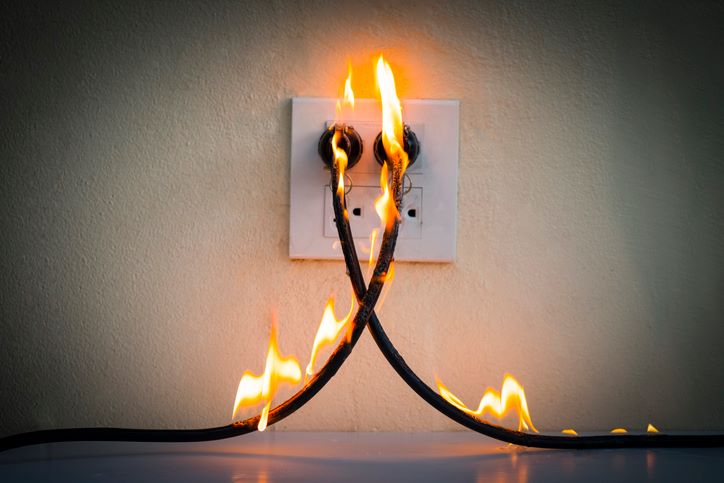
Electrical fires are one of the most frightening and potentially devastating incidents that can occur in a rental property. Not only do they pose a significant threat to the safety and well-being of tenants, but they can also result in extensive property damage, financial loss, and even injury or loss of life.
In the aftermath of such a traumatic event, many tenants find themselves wondering if they have any legal recourse against their landlord. Can you sue your landlord for an electrical fire? What are your rights as a tenant, and what steps should you take if you’ve experienced an electrical fire in your rental property?
Understanding Landlord Responsibility for Tenant Safety
As a tenant, you have the right to live in a safe and habitable environment. This includes protection from hazards such as electrical fires. Landlords have a legal obligation to ensure that the rental property meets certain safety standards, including the proper maintenance of electrical systems and wiring. Failure to fulfill this duty of care can constitute negligence on the part of the property owner.
Leading Causes of Electrical Fires
Electrical fires can be caused by a variety of factors, many of which are preventable with proper maintenance and inspection. Some of the leading causes of electrical fires in rental properties include:
Faulty Wiring: Poorly installed or outdated wiring can increase the risk of electrical fires.
Electrical Overloads: Plugging too many devices into a single outlet or circuit can overwhelm the electrical system and lead to fires.
Poor Electrical Installation: Improper installation of electrical components, such as outlets and switches, can create fire hazards.
Rodents: Rodents chewing on electrical wiring can damage insulation and create short circuits, increasing the risk of fires.
Natural Deterioration of the Building and Wiring: Over time, wear and tear on the building and its electrical systems can compromise safety.
Aluminum Wiring: Corrosion of aluminum wiring connections can lead to overheating and fires.
Ungrounded Wiring: Lack of proper grounding increases the risk of electrical fires.
How Do Electrical Fires Occur?
Electrical fires occur when an electrical current generates heat in excess of what the system or wiring can handle. This can ignite nearby combustible materials, such as insulation or furniture, leading to a fire. In some cases, electrical fires may start within walls or ceilings, making them difficult to detect until they have already caused significant damage.
Signs of Electrical Issues or Faulty Wiring
It’s important for tenants to be aware of the warning signs of electrical problems in their rental property. These may include:
Flickering Lights: Lights that flicker or dim unexpectedly may indicate a wiring issue.
Burn Marks or Scorching: Discoloration or burn marks around outlets, switches, or electrical panels could be a sign of overheating.
Tripped Circuit Breakers: Frequent tripping of circuit breakers may indicate an overloaded electrical system.
Strange Odors: Burning or unusual odors coming from outlets or electrical appliances could indicate a problem.
If you notice any of these signs, it’s important to report them to your landlord or property management company immediately.
Your Rights as a Renter
As a renter in the state of Nevada, you have certain rights and protections under the law. These include the right to:
Safe and Habitable Housing: Landlords are legally required to provide tenants with housing that meets basic health and safety standards.
Repairs and Maintenance: Landlords are responsible for maintaining the rental property in a safe and habitable condition, including addressing electrical issues promptly.
Quiet Enjoyment: Tenants have the right to peaceful and uninterrupted enjoyment of their rental unit.
Right to Pursue Legal Action: If you suffer harm or damages due to your landlord’s negligence, you have the right to pursue legal action for compensation.
If your landlord has failed to uphold these obligations and you have suffered harm as a result, you may have grounds to pursue legal action.
Who Is Responsible for an Electrical Fire?
Determining responsibility for an electrical fire can depend on various factors, including the specific circumstances of the incident and applicable laws in the jurisdiction where it occurred. Generally, responsibility for an electrical fire may lie with:
Landlord: In rental properties, landlords typically have a legal duty to maintain the premises in a safe and habitable condition, including ensuring that electrical systems and wiring are in good repair. If an electrical fire is caused by the landlord’s failure to address known hazards or properly maintain the property, they may be held responsible.
Tenant: In some cases, tenants may be responsible for electrical fires if they engage in behavior that creates a fire hazard, such as overloading electrical outlets, using damaged appliances or equipment, or tampering with electrical wiring without permission.
Electricians or Contractors: If an electrical fire caused by faulty installation or repair work performed by an electrician or contractor, they may be held liable for the resulting damages.
Can I Sue My Landlord for Electrical Fire?
Yes, you may have grounds to sue your landlord for an electrical fire if you can demonstrate that their negligence or failure to maintain the property directly contributed to the fire. To determine whether you have a viable legal claim, consider the following factors:
Landlord Negligence: You must establish that your landlord breached their duty of care by failing to address known electrical hazards or properly maintain the property’s electrical system.
Causation: You need to demonstrate that the electrical fire was a direct result of your landlord’s negligence or failure to fulfill their obligations to ensure the safety of the rental property.
Damages: You must have suffered harm or damages as a result of the electrical fire, such as property damage, medical bills, or lost wages.
Evaluating Landlord Negligence in Electrical Fire Cases
In order to pursue legal action against your landlord for an electrical fire, you will need to establish that their negligence directly contributed to the incident. This may involve demonstrating that:
The landlord was aware or should have been aware of the electrical issues or hazards present in the rental property.
The landlord failed to take reasonable steps to address or rectify these issues in a timely manner.
The electrical fire was a direct result of the landlord’s negligence or failure to maintain the property.
How to Sue Your Landlord for an Electrical Fire
Suing your landlord for an electrical fire is a complex legal process that requires careful preparation and consideration. Here’s a general guide on how to proceed:
Assess the Situation: Evaluate the circumstances of the electrical fire, gathering evidence and documentation.
Understand Your Rights: Familiarize yourself with tenant rights and landlord responsibilities under local laws.
Consult with a Lawyer: Seek guidance from a lawyer specializing in landlord-tenant law to assess the viability of legal action.
Document Damages: Keep detailed records of all damages incurred, including property damage and related expenses.
Notify Your Landlord: Inform your landlord in writing of your intent to pursue legal action, outlining the damages and circumstances.
Attempt Mediation or Negotiation: Explore options for resolving the dispute outside of court through mediation or negotiation.
File a Lawsuit: If negotiations fail, proceed with filing a lawsuit against your landlord with the assistance of your attorney.
Litigation Process: Engage in the legal process, including discovery, court hearings, and possibly a trial, guided by your legal representation.
Can I Hold My Landlord Liable for an Electrical Fire?
Whether or not you can hold your landlord liable for an electrical fire will depend on the specific circumstances of your case. If you can demonstrate that the fire was caused by the landlord’s negligence or failure to maintain the property, you may be able to recover compensation for damages such as:
Property Damage: The cost of repairing or replacing damaged belongings, as well as any structural damage to the rental property.
Medical Bills: Expenses related to medical treatment for injuries sustained in the fire.
Lost Wages: If you were unable to work as a result of the fire or related injuries, you may be entitled to compensation for lost income.
Pain and Suffering: Compensation for physical pain, emotional distress, and other non-economic losses.
How to Pursue a Claim
Pursuing a claim against your landlords for an electrical fire can be complex, and it’s important to seek guidance from an experienced legal professional. A personal injury lawyer with expertise in landlord-tenant law can help you navigate the legal process and advocate for your rights.
Knowing When Your Home’s Wiring Is Outdated and Dangerous
If you’re living in an older rental property, there’s a higher likelihood that the wiring may be outdated and potentially dangerous. Homes built before the 1980s may contain aluminum wiring, which is prone to overheating and poses a fire hazard. Additionally, ungrounded wiring or a lack of ground fault circuit interrupters (GFCIs) in areas with water exposure can increase the risk of electrical fires.
How an Attorney Can Assist You in a Case Involving an Electrical Fire in Your Rental Property
In the aftermath of an electrical fire in your rental property, navigating the legal landscape can be complex and daunting. This is where an experienced attorney specializing in landlord-tenant law can be invaluable. Here’s how an attorney can help you in this case:
Legal Analysis: Attorneys analyze the legal aspects of your case, including lease agreements and state laws.
Evidence Gathering: They gather evidence such as maintenance records, inspection reports, and witness statements.
Assessment of Liability: Attorneys assess whether the landlord’s actions constituted negligence and contributed to the fire.
Evaluation of Damages: They evaluate the full extent of your damages, including personal property damage and personal injuries.
Negotiation with Insurance Companies: Attorneys handle negotiations with other’s insurance company to maximize your recovery.
Legal Representation in Court: If necessary, attorneys represent you in court, presenting evidence and advocating for your interests.
Mediation or Alternative Dispute Resolution: Attorneys may pursue alternative dispute resolution methods to reach a settlement outside of court.

Discover Your Legal Options Today with BLG
In conclusion, if you’ve experienced an electrical fire in your rental property, you may have legal options available to you. By understanding your rights as a tenant and the obligations of your landlord, you can take appropriate steps to hold the responsible parties accountable and seek compensation for your losses. If you have any questions or need assistance with potential fire injury claims, don’t hesitate to reach out to a qualified legal professional for help.
If you’ve experienced an electrical fire in your rental property and believe your landlord may be responsible, don’t wait to seek justice. Our experienced team at BLG is here to help you understand your rights, navigate the legal process, and fight for the compensation you deserve.
Contact us today for a free consultation.
FAQs
What is considered uninhabitable living situations for a tenant in Nevada?
Uninhabitable living conditions in Nevada may include issues such as lack of heating or cooling, infestation, plumbing problems, or significant safety hazards. These conditions would generally violate the implied warranty of habitability, requiring the landlord to remedy them.
Is an electrical fire accidental?
An electrical fire can be accidental in nature, often caused by malfunctioning electrical systems, faulty electrical wiring, or electrical appliances. However, it’s essential to investigate the specific circumstances of the fire to determine its cause accurately.





